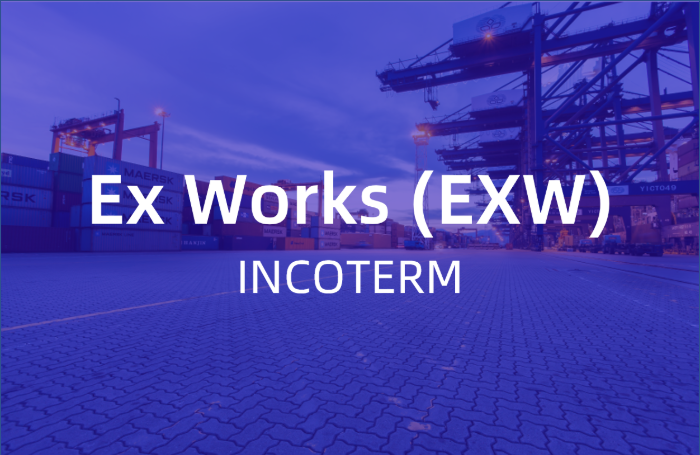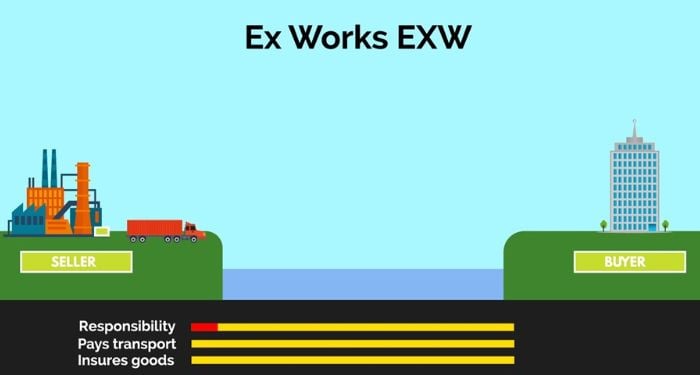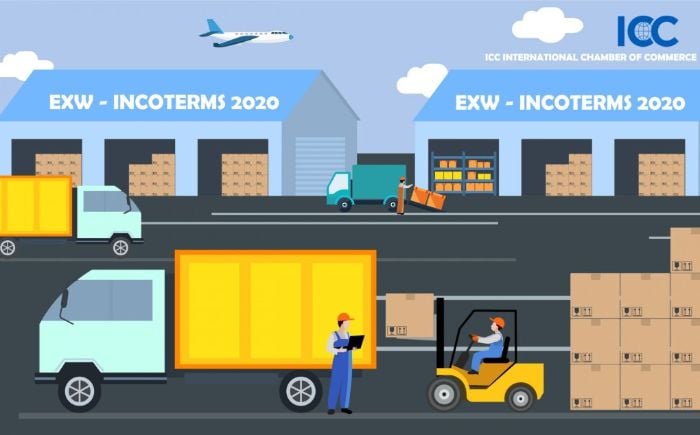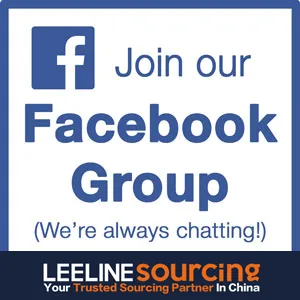There are several ways to get your order delivered while trading internationally. Today we will explore EXW (Ex Works), the international shipping term.
We have been in trading business for more than a decade now, knowing how these things work. We can better convey how this whole process can help you. Also, what are the significant points you should be aware of before closing any deal on this term?
In this article, we have discussed EXW. When should you use EXW? What are the risks involved and the pros and cons of this commercial term?

What is Ex Works (EXW)?
Ex Works (EXW) is a phrase used in international trade. It denotes when a seller makes a product available at a specified place, and the buyer handles the transportation costs. You will often see it in the shipment agreements. When working under the EXW terms, buyers can enjoy complete control benefits for the shipping process. Also, the buyer is in a better position for the cheaper products. But when we talk about the cost of customs clearance and export licenses, things might not be suitable for the buyer.
When to use EXW?
Most organizations will use the EXW arrangements when a seller cannot export. Even when a buyer wants to add shipments and export them under a single name.
Another reason to choose EXW is if they’re sending Air Express. Express couriers pick up cargo from the seller’s location. They cover all transportation costs and export documents.
Some of our buyers who prefer to handle their own logistics opt for EXW shipping. If this ever happens to you, communicate the terms well. Clearly explain the responsibilities of both parties, and agreement should be met sideways.
What are the Buyers and Sellers’ Responsibilities with EXW?

Seller’s Responsibilities:
The seller’s responsibilities under the EXW Incoterms are minimal. They request that the cargo is packaged and ready for export and picked up from their location. The products are already packed into export cartons for most shipments. When the freight is prepared, the seller must deliver it to an area where the buyer can pick it up.
Buyer’s Responsibilities:
From experience, the responsibilities of a buyer are much more complex. When the customer’s collecting vehicle collects the products from the seller, they take all risks and liabilities. The following are some of these responsibilities:
- Charges for Loading: Loading the cargo at the pickup point to be transported to the port for export.
- Delivery to Port or Place: Transporting the products to the origin port. The export process begins here.
- Export Duty, Taxes & Customs Clearance: All export papers and the payment of any duties are due to the cargo’s export. The buyer must rely on their export techniques.
- Terminal Charges at the Origin: The buyer is responsible for all fees at the terminal.
- Carriage to Load: The burden of responsibility for loading the cargo onto the carriage.
- Transportation Fees: All freight charges are incurred in transporting cargo from one port to another.
- Insurance: Freight insurance is recommended to safeguard against damage, theft, and loss.
- Terminal Fees at the Destination: All costs levied by the destination port and terminal are included in this charge. When the cargo arrives at the target port, the terminal will charge fees. You have to pay to unload the shipment off the ship and move it around the harbor.
- Destination Delivery: Transport charges from the destination port to the ultimate destination.
- Destination Unloading: They also bear the cost of the unloading from the last carrier.
- Import Duty, Taxes & Customs Clearance: They also bear the duties and taxes in the destination country.
Pros and Cons of EXW
The advantage of EXW for a seller is a good one. Why? Well, as a seller, we’re only responsible for covering the bare minimum of duties and expenditures. However, the EXW agreement may also provide benefits to buyers.
The buyers bear the shipping expenses and responsibilities. That’s why they have complete control over the shipping process. Also, they can ensure that the products arrive safely. Following local transit, the shipping method is advantageous. Purchasers can better predict expenses and avoid paying a more significant shipping fee.
Clearing customs is one of the most significant disadvantages of EXW. The EXW rules demand simple documentation for export approval. The buyers are responsible for additional costs and delays. The purchaser also bears the cost of export customs inspection if required.
If a seller does not have an export license, he will generally choose to use EXW conditions. The customer will be responsible for paying for it. Buyers must look for the right freight forwarders. Seek those who can provide door-to-door service and customs clearance.
Buyers should evaluate freight fees and the benefits and drawbacks of various incoterms. Especially when determining a shipping arrangement to calculate explicit and implicit expenses.
Below are some of the benefits and drawbacks of EXW.
Ex Works Shipping Terms Pros:
- From the beginning, all costs are specified.
- It’s unusual to suffer additional fees.
- The supplier cannot increase the delivery margin.
Ex Works Shipping Terms Cons:
- You are responsible for all the risks from your supplier’s premises to your front door.
- Without more examination, the costs are not as evident.
- Any fees incurred at customs in the country of origin are your responsibility.
A Fast , Easy and Cheap Way to Ship from China
Do not hesitate to contact Leeline Sourcing at any time regarding your shipments from China.
EXW vs. FOB vs. DDP
EXW (Ex-works) indicates that the seller only needs to pack the items and wait for them to be picked up at their location. The buyer bears most of the costs and hazards.
Another sort of Incoterms is Free-On-Board (FOB), which is also the most often utilized. Once the seller has transported the products from the “shipping point,” the buyer assumes ownership of the products. He bears the risk under the FOB origin or FOB shipping point terms. The risks and rights of the products stay with the seller until the consumer receives them under the FOB terms.
Suggested reading: Free-On-Board (FOB)
In the case of DDP, the seller handles almost everything. From packing and checking in their warehouse to delivery at the final destination. His responsibilities also include export and import clearance. Eventually, the buyer takes over the duties. He then becomes responsible for the whole transportation process. From the destination to the final destination.
The only thing that I can advise you when choosing between these three shipping options is to weigh the situation. Discuss the risks and advantages to your customers to ensure a smooth transaction.
Suggested reading: Alibaba DDP Shipping
EXW Risks

In the country of origin, not all commodities pass through customs. If the customs documentation isn’t in order, it’s the buyer’s responsibility with Ex Works (EXW) shipping.
The customer is liable for any additional fees incurred at customs; the seller is not. Also, the shipping company increases the buyer’s Ex Works shipping cost.
Ex Works terms may not be the best option in some countries because customs need the seller to assist with the reporting and clearance of goods. Take note of this information to avoid going through the same challenges as our first-time customers. Thus a Free Carrier contract (FCA) should be considered instead. The seller agrees to organize the delivery of goods from the factory to a warehouse, port, or terminal under an FCA contract. Once the vehicle is delivered, the risk is transferred to the buyer.
Suggested reading: Free Carrier (FCA)
Example of Ex Works
An example case study to grasp EXW. An international buyer placed a significant order with a California company. The company offered a considerable reduction on Ex Works unit price quote, eager to accept this large order. The customer promptly consented, but the goods were being sold at a discount through a chain of U.S. retail outlets.
The naive exporter is unaware that the Ex Works terms do not need the buyer to export the products, making diversion a severe possibility. They had a costly lesson to learn. The corporation purchased underpriced merchandise to avoid competing for domestic items.
Looking for the Best China Sourcing Agent?
Leeline Sourcing helps you find factories, get competitive prices, follow up production, ensure quality and deliver products to the door.
FAQs about EXW
1. What is EXW on Alibaba?
In an Ex Works contract, the buyer agrees to pick up the items from the manufacturer’s warehouse. He also handles any transactional documentation. Clearance at customs and insurance are included in this paperwork.
2. Does EXW Incoterms include duties and taxes?
The buyer is responsible for all import duties, taxes, and customs clearance when shipping under EXW Incoterms. The buyer is responsible for all parts of the exportation, freight, and importation processes under EXW. The only responsibility on the seller’s end is the packaging.
3. How to Calculate an Ex-Works Price?
Removing the seller’s value-added for shipping computes ex-works costs to decrease expenses. Assume that company A has set a $6,000 for a pair of printers from company B, plus a $300 ex-works shipping fee.
Company A finds a third-party shipping company that would deliver goods for $240 to save money. So, to save $60 on delivery, they strike an ex-works agreement with firm B.
4. Who pays freight on Ex-works?
The Ex Works contract is a shipping agreement where a vendor makes a product available at a particular place. Still, the buyer is responsible for the whole transportation process, including freight costs, etc.
What’s Next
EXW is one of the international shipping terms published by the International Chamber of Commerce (ICC).
According to the EXW conditions, buyers are liable for shipping costs and hazards. The sellers are only responsible for making products available at a designated location.
Buyers can profit from total control over the shipping process under EXW terms. But the expense of customs clearance and export licenses may negate these savings.
Are you looking for more information about Ex Works shipping terms? Dont know whether it’s beneficial for you or not? Check out our service page to find out the solution.








